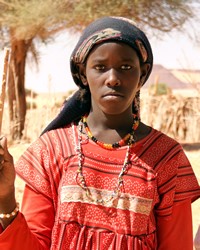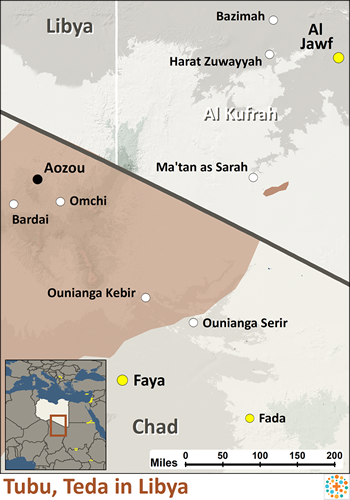The Tubu (AKA, Toubou) are desert warriors living in the eastern and central Sahara Desert. They are very tough, solitary mountain and desert people and have often clashed with neighboring groups. In many places, they are regarded as foreigners in their own countries. They live in Nigeria, Chad, Niger, Mali and southern Libya. Those in Libya have sometimes been driven out of the country or marginalized. Their language is Tedaga.
Traditionally, the Tubu controlled the caravan trade routes that passed through their territory. They were known for plundering these caravans and trading slaves.
Stealing and killing are fairly acceptable in their culture and are even respected by many.
Tubu culture gives little respect to agricultural work. Reluctant to rely on cultivation, they depend on a flexible nomadic economy for survival. Their property system favors mobility and military strength over securing land and farming it. As a group, the Tubu are divided into many clans, based on a common male ancestor.
The Tubu are primarily herdsmen, but they practice agriculture when necessary. Some irrigation is always necessary and they fertilize crops with animal manure. They grow vegetables, grains, fruits, legumes and root crops. The date palm is the main food plant: a single tree can produce 45 pounds of dates per year, and a person can eat several pounds a day. Dates are the main food in the spring and summer, milk products during the late summer and fall, and gathered fruits and seeds in the winter. Milk from goats, sheep, and camels is another basic part of the Tubu diet. In addition, many Tubu must hunt with dogs and gather wild fruits and seeds to further supplement their food supplies.
Livestock is the main source of wealth in Tubu society. Camels and goats are the most common animals. Nomadic Tubus ride camels while settled farmers primarily raise goats. The Tubu also raise donkeys, sheep, dogs, chickens and pigeons. The men are responsible for herding the camels, as well as for hunting and trading. Women tend to the goats and till the soil.
There are six social classes in Tubu society: nobles, commoners, dependent farmers, metal workers, servants and slaves. Marriages involve the payment of a substantial bride price, which consists of livestock. The price may range from one sheep to ten camels, with two camels being the average. Part of this payment is given to the newlyweds to help them set up their own household. Polygamy (having more than one spouse) is permitted but rarely practiced. The Tubu live in patriarchal (male-dominated) extended family units. The oldest man in the family has authority until his death.
Most Tubu live in small communities with less than a few hundred inhabitants. The more settled groups who live in the villages are not there for the whole year. Generally, they live in round huts with stone or mud walls. The huts have cone-shaped thatch roofs supported by a central post. The nomadic Tubu often live in rectangular or oval-shaped tents that have wooden frames and mats made of palm leaves or animal skins. Sometimes, they use caves for shelter while looking for pasture.
The Tubu are all Muslim. However, prior to their conversion, they were animists (believed that non-living objects have spirits). They converted to Islam in the 1800s, but only after almost 1000 years of contact with Arab Muslims. Their animistic background, however, has been blended with their Muslim practices. Today, the Tubu follow the Islamic calendar, including fasting during the holy month of Ramadan. Both men and women faithfully say daily prayers, and more of them are now making pilgrimages to Mecca.
The Tubu people are limited by the lack of water. If someone with the right expertise helped them find water sources, it would help them tremendously. They have a low literacy rate, so schools would help them advance economically.
Pray for the Lord to show himself all powerful and loving by providing the Tubu people abundant rain this year.
Pray for Tubu family leaders to have dreams of the righteous and all powerful Lord, opening their hearts to Jesus.
Pray for loving and dedicated workers to go to the Tubu people in Libya.
Pray for Christ followers with veterinarian skills to dedicate their lives to seeing a strong Tubu church.
Scripture Prayers for the Tubu, Teda in Libya.
https://en.wikipedia.org/wiki/Toubou_people
https://www.101lasttribes.com/tribes/toubou.html
https://www.visualtribes.com/tribes/toubou.html
| Profile Source: Joshua Project |

























